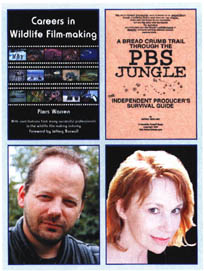REALSCREEN MAGAZINE

Left: Piers Warren, author of Careers
in Wildlife Film-making.
Right: Patric Hedlund, author of A
BREAD CRUMB TRAIL THROUGH
THE PBS JUNGLE: The Independent Producer's Survival Guide
Copyright © 1986-2007 Brunico Communications, Inc. All rights reserved.
The title and logo of RealScreen and RealScreen Plus are trade
marks of Brunico Communications Inc.

Filmmakers-turned-authors
offer practical advice
for navigating the industry
by Jonathan Link
July 1, 2002-- Shark attacks, avalanches and insect swarmings are only the tip of the danger iceberg for the wildlife filmmaker. The industry is in a period of massive change, and unemployment is fast rising as the biggest threat to the natural history documentarian. Enter Piers Warren and Patric Hedlund, two filmmakers who have recently written books that address the changing needs of the documentary producer. The news, while not as positive and gravy smothered as in the past, is good - if you can adapt to the challenges ahead.
Warren's Careers in Wildlife Film-making tackles issues relevant to all natural history filmmakers, such as audience profile, technological changes, broadcasting, and actual and potential markets. But, the book is most useful in the hands of filmmakers just breaking into the industry. The majority of the work is devoted to the nuts and bolts of making a wildlife film, the realities of the business in general and the types of people who succeed in it. Insightful thoughts on the industry's future comprise two sections of Careers. Chief executive of the WildScreen Trust, Jane Krish, looks at the impact of new technologies. BBC producer Mark Bristow predicts that cross-genre programming is the way forward. Using short essays written by individuals in the field such as Krish and Bristow, Warren fleshes out the issues, proffers advice and ponders ramifications.
Further, Careers stresses that people looking for money and glamour in the wildlife filmmaking world are barking up the wrong giant sequoia. Entertaining first-person testimonials and case studies reveal that passion and resilience are the attributes necessary to make it. "There was nothing like this when I started," says Warren, who decided to write the book after finding himself repeating the same advice to young people. "A few people will be put off, but if that's their reaction they probably don't have what it takes to get in there anyway," he says.
A Breadcrumb Trail Through the PBS Jungle: The Independent Producer's Survival Guide, written by Hedlund, is aimed at documentarians of all stripes. Structured as a producer's workbook and advanced checklist, Breadcrumb Trail focuses on the U.S. public broadcasting system, though much of the advice makes sense for dealing with other broadcasters too.
Hedlund - a media anthropologist - sets out to demystify PBS and offers guidelines that encourage indies to "carefully consider the business side of their projects."
Sections include 'The Big Picture: Distribution and Funding', 'PBS Flagship Series: Hitching a Ride' and 'Inside Secrets: PBS Pubcasters Speak'. Says Hedlund,
"The goal [of Breadcrumb Trail] is to encourage independents to stay financially healthy so they can go on to make many more productions."
Unlike Careers, Breadcrumb Trail is targeted at readers already in the business. Still, the information is detailed and thorough to the point of being exhaustive. This truly is a work to read before embarking on a project to be sold to PBS - or anyone else - and reread until your mother watches the initial first-window broadcast.
Although written for different audiences, both books are full of passion. Like all good producers,
Warren and Hedlund are driven by a need to tell stories that are conspicuously absent from the airwaves.
"We need strong, healthy, independent voices in American public media to encourage productive debate and the circulation of new ideas," says Hedlund of documentary filmmaking in general.
Adds Warren, "Our challenge [as filmmakers] is to educate, because we are in a unique position to do that - most people learn via TV. We have to be positive and entertaining and give the audience a way to participate."